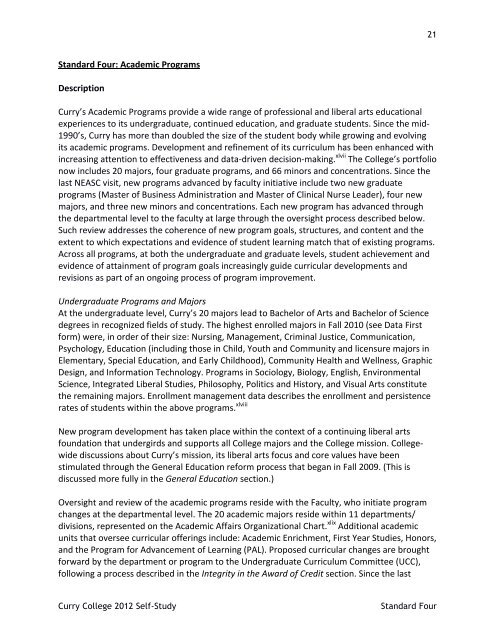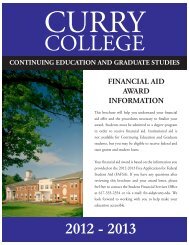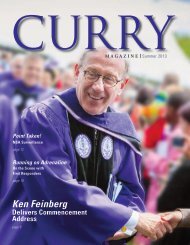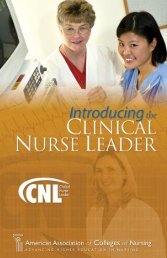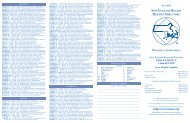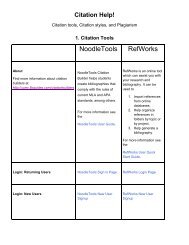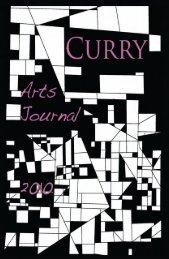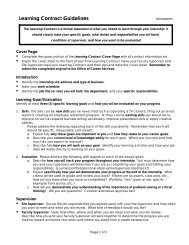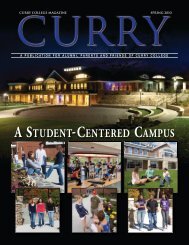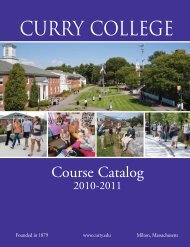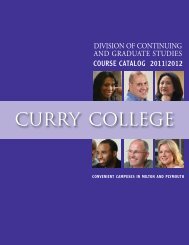Read the Curry College NEASC 2012 Self-Study Report.
Read the Curry College NEASC 2012 Self-Study Report.
Read the Curry College NEASC 2012 Self-Study Report.
Create successful ePaper yourself
Turn your PDF publications into a flip-book with our unique Google optimized e-Paper software.
21<br />
Standard Four: Academic Programs<br />
Description<br />
<strong>Curry</strong>’s Academic Programs provide a wide range of professional and liberal arts educational<br />
experiences to its undergraduate, continued education, and graduate students. Since <strong>the</strong> mid‐<br />
1990’s, <strong>Curry</strong> has more than doubled <strong>the</strong> size of <strong>the</strong> student body while growing and evolving<br />
its academic programs. Development and refinement of its curriculum has been enhanced with<br />
increasing attention to effectiveness and data‐driven decision‐making. xlvii The <strong>College</strong>’s portfolio<br />
now includes 20 majors, four graduate programs, and 66 minors and concentrations. Since <strong>the</strong><br />
last <strong>NEASC</strong> visit, new programs advanced by faculty initiative include two new graduate<br />
programs (Master of Business Administration and Master of Clinical Nurse Leader), four new<br />
majors, and three new minors and concentrations. Each new program has advanced through<br />
<strong>the</strong> departmental level to <strong>the</strong> faculty at large through <strong>the</strong> oversight process described below.<br />
Such review addresses <strong>the</strong> coherence of new program goals, structures, and content and <strong>the</strong><br />
extent to which expectations and evidence of student learning match that of existing programs.<br />
Across all programs, at both <strong>the</strong> undergraduate and graduate levels, student achievement and<br />
evidence of attainment of program goals increasingly guide curricular developments and<br />
revisions as part of an ongoing process of program improvement.<br />
Undergraduate Programs and Majors<br />
At <strong>the</strong> undergraduate level, <strong>Curry</strong>’s 20 majors lead to Bachelor of Arts and Bachelor of Science<br />
degrees in recognized fields of study. The highest enrolled majors in Fall 2010 (see Data First<br />
form) were, in order of <strong>the</strong>ir size: Nursing, Management, Criminal Justice, Communication,<br />
Psychology, Education (including those in Child, Youth and Community and licensure majors in<br />
Elementary, Special Education, and Early Childhood), Community Health and Wellness, Graphic<br />
Design, and Information Technology. Programs in Sociology, Biology, English, Environmental<br />
Science, Integrated Liberal Studies, Philosophy, Politics and History, and Visual Arts constitute<br />
<strong>the</strong> remaining majors. Enrollment management data describes <strong>the</strong> enrollment and persistence<br />
rates of students within <strong>the</strong> above programs. xlviii<br />
New program development has taken place within <strong>the</strong> context of a continuing liberal arts<br />
foundation that undergirds and supports all <strong>College</strong> majors and <strong>the</strong> <strong>College</strong> mission. <strong>College</strong>wide<br />
discussions about <strong>Curry</strong>’s mission, its liberal arts focus and core values have been<br />
stimulated through <strong>the</strong> General Education reform process that began in Fall 2009. (This is<br />
discussed more fully in <strong>the</strong> General Education section.)<br />
Oversight and review of <strong>the</strong> academic programs reside with <strong>the</strong> Faculty, who initiate program<br />
changes at <strong>the</strong> departmental level. The 20 academic majors reside within 11 departments/<br />
divisions, represented on <strong>the</strong> Academic Affairs Organizational Chart. xlix Additional academic<br />
units that oversee curricular offerings include: Academic Enrichment, First Year Studies, Honors,<br />
and <strong>the</strong> Program for Advancement of Learning (PAL). Proposed curricular changes are brought<br />
forward by <strong>the</strong> department or program to <strong>the</strong> Undergraduate Curriculum Committee (UCC),<br />
following a process described in <strong>the</strong> Integrity in <strong>the</strong> Award of Credit section. Since <strong>the</strong> last<br />
<strong>Curry</strong> <strong>College</strong> <strong>2012</strong> <strong>Self</strong>-<strong>Study</strong><br />
Standard Four


